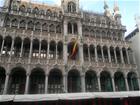The Debt Crisis as Driving Force - a Lesson from Belgium
Evelina Topalova, December 5, 2011
 For the first time in more than 30 years a French-speaking politician will take the reins of a government in Belgium following an agreement between six parties from Flemish and Walloon blocks that were involved in coalition talks.
For the first time in more than 30 years a French-speaking politician will take the reins of a government in Belgium following an agreement between six parties from Flemish and Walloon blocks that were involved in coalition talks.
The sides stroke an agreement on the programme of the new cabinet on November 30 and now will have to share ministerial seats. The parties involved in the talks - three Flemish and three Walloons - will make up a politically heterogeneous coalition that will bring together socialists, Christian-democrats and liberals. Flemish nationalists N-VA of Bart De Wever will be left out of the cabinet despite being the first political force in Flanders.
The six parties from the new ruling coalition will hold conventions to confirm the 180-page agreement, and afterwards the government will need to win a confidence vote in Parliament next month and to be sworn in. This should eventually put an end to the saga that lasted for more than 530 days and appease investors.
Pressure from financial markets
In the end, it was the debt crisis that forced politicians from both communities to accelerate talks and clinch a deal on power sharing.
The Standard & Poor's' decision from November 25 to cut Belgium's rating from AA+ to AA exerted additional pressure on the negotiating sides, who overcame their disagreements on budget issues in a hurry. Under the agreement, the 2012 budget sees the deficit slashed to 2.8% of GDP from 3.6% in 2011 thus meeting the European Commission requirements. The long-term fiscal framework sees a balanced budget in 2015. The budget foresees a number of restrictive measures such as a pension reform and cuts in unemployment benefits. Trade unions did not wait to respond by calling a big demonstration on December 2 in Brussels which was expected to gather thousands of their members.
Restrictive measures are inevitable if the country is willing to avoid Greek-, Irish- or  Portuguese-like scenarios considering the fact that Belgium's government debt is one of the largest within the eurozone and is expected to reach 97% of GDP this year. The S&P's decision to downgrade Belgium's rating has shown that the debt crisis is spreading from the periphery to the heart of the eurozone.
Portuguese-like scenarios considering the fact that Belgium's government debt is one of the largest within the eurozone and is expected to reach 97% of GDP this year. The S&P's decision to downgrade Belgium's rating has shown that the debt crisis is spreading from the periphery to the heart of the eurozone.
Negotiations on the new federal cabinet of the country, that broke world records with a lack of government for a total of 18 months, were led by the leader of Walloon socialists Elio Di Rupo.
Who is Elio Di Rupo?
The 60-year-old politician is not only the first French-speaking prime minister of Belgium in more than three decades and the first socialist leading the government since 1974 but he is also one of the few leaders who have admitted openly their homosexuality. His family has Italian backgrounds, he holds a PhD in chemistry and he has been at the helm of the SP since 1999. Di Rupo is an experienced politician being a  lawmaker, senator, MEP, minister. The bow-tie is his trademark. In a country, where the linguistic disputes are as much important as political and economic ones, and where 60% of the population speaks Flemish (Dutch), the appointment of a French-speaker as prime-minister could be a minus but Di Rupo promised to improve his poor Flemish.
lawmaker, senator, MEP, minister. The bow-tie is his trademark. In a country, where the linguistic disputes are as much important as political and economic ones, and where 60% of the population speaks Flemish (Dutch), the appointment of a French-speaker as prime-minister could be a minus but Di Rupo promised to improve his poor Flemish.
Elio Di Rupo is expected to take the helm of the country in a tough moment for both Belgium and Europe. Sacrifices that Belgians will have to make will not be minor and it would be interesting to see how a prime minister socialist would handle the cuts in social benefits and whether he will be able to resist the social pressure and to implement the needed reforms. The prime ministers of Greece and Spain failed to do so.
 Klaus Regling | © Council of the EU
Klaus Regling | © Council of the EU Mario Centeno | © Council of the EU
Mario Centeno | © Council of the EU Mario Centeno | © Council of the EU
Mario Centeno | © Council of the EU